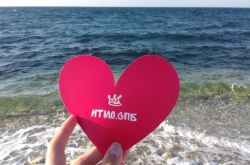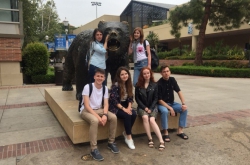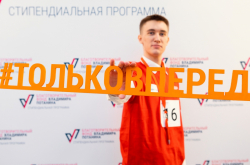Semen Mironov, Master’s student at the Instrumentation Technologies Department
I learned about the contest conducted by ITMO’s Academic Mobility Support Office from my department’s staff, and decided to use this opportunity to go to the city of Emden (Germany). This is not my first trip there - this time, three people from my department will go there. We are planning to finish a collaborative project with our German colleagues from Hochschule Emden/Leer. I attended a similar event last year: that time, we were coding restlessly throughout our visit. I went on that trip without additional funding from the university, but this year I’ve decided to give the contest a shot, which covered 70% of my expenses.
 Semen Mironov
Semen Mironov
We’ve been doing our collaborative project since 2016. Each year, students from Hochschule Emden/Leer come to our university, this project being part of their term thesis. Their educational program implies getting experience of international collaboration, so their lecturers seek to include their project work in collaboration with international researchers from other universities, us, for instance. Last time, our task was to design a layout of an intelligent production unit, this time we’re working on creating a virtual company. Last time, the project had to do with mechanics, this time it’s about code only. Each year it happens so that we finish our work when we meet in Germany. And there’s always a lot to do - we are going to work from morning till night. All our projects are part of a greater task that is beneficial to our department. I’ve decided to go there for a second time, as it is a very interesting experience. Also, Germany is now getting ready for Christmas, and I think in Europe right now will be great.
Interacting with the Academic Mobility Support Office was really easy. I didn’t have to gather too many documents - mostly those were the expense budget and a certificate approving my command of language. I got the latter at ITMO’s Foreign Language Training Center after passing a test. After that, I only had to send scanned copies of my academic progress, the expense budget and the certificate via email - everything else has been done by the office’s staff. It all worked out a lot faster than I expected.
Maksim Genko, final year’s Bachelor’s student at the Instrumentation Technologies Department
It was my lecturer who told me about the contest. I made use of this opportunity this June when I went to Emden (Germany) for the 10 days of the 3rd International Summer School on Intelligent Agents in Automation, which was dedicated to the subject of design, development and introduction of intelligent systems in production. The summer school took place at Hochschule Emden/Leer. For me, it has become a serious career enhancement. There, I got to listen to different lectures and participate in a project alongside other students: we had to introduce in practice a simplest multiagent system. What I remembered most was a lecture by professor Paulo Leitão on ontologies in multiagent systems, why they are so important and how they work. Ontologies allow to define relations between agents and introduce the common terms of their communication, which really simplifies a system’s creation.
Other German scientists and representatives of industry also participated in the conference, where they presented new technologies. The school lasted for five days, and we also had three-day long special training where we listened to lectures.
Ivan Ustugov, Bachelor’s student at the Department of Mechatronics
 Ivan Ustugov
Ivan Ustugov
I learned about the contest at the Department of Mechatronics where I study. When the question about an opportunity to go on a trip to an exhibition came on, they proposed taking part in such a contest.
Robotex is the biggest annual robotics festival in Europe. Actually, it is two events in one. At the same time, both competitions in robotics and an exhibition in which student teams and major producers participate take place. The event is organized by ITMO’s long-standing partners - Tallinn University of Technology and University of Tartu. Robotex-2017 took place in Estonia’s capital from November 24 to 26. I took part in the exhibition and presented a modular mobile mechatronic unit developed in collaboration with students from our department.
During the three days of the festival, a lot of motivated people from Estonia, Sweden, Norway, Poland and Finland came to ITMO’s booth, we got valuable feedback that can help us in developing our project. In general, people show great interest in our university, ask questions about applying to ITMO. It was a pleasure to hear that many participants or their relatives once studied there.
I decided to participate in the event, as the experience of such trips is always unique. What is more, when focusing on such a rapidly developing field as robotics, one has to possess relevant knowledge. Not only does communicating with people from other countries help improve your language skills, it also helps be up to speed with new approaches to solving different technical issues. Learning others’ opinions of our invention and understanding how we should develop it was also very important.
Interaction with the Academic Mobility Support Office was well-organized. I could apply for it remotely, and had no need to spend time on travelling between buildings. After my application was approved, I got all the necessary instructions on filling the documents in an email, and could discuss any emerging issues on the phone. One of the mandatory requirements was proving your level of English. For that, the university helps its students by offering special assessments and issuing a relevant certificate.
Anastasia Svarovskaya, Master’s student at the Department of Physics
I learned about the contest from my research advisors. I focus on space sciences, so I decided to take part in a conference that took place in Memorial Museum of Cosmonautics in Moscow this November. Surely, I applied for the contest for financial support.
I would say that the conference was about “Space in Humanities” - about how space exploration affects culture, about its philosophy, about “space fashion” and art that focuses on space. I learned about the conference from the internet and decided to go at once, because I work in this field and, more importantly, the topic of my thesis is related to that of the conference. At the conference, I expanded on the promotion of Soviet space science in modern filmmaking. And the topic of my Master’s thesis has to do with Russian and Soviet space documentaries. My task is to watch as many movies on this topic as possible (as of now, most of them are stored on reel drums in governmental archives), and analyze them within the historic context: define particular periods so as to understand what the storyline focused on in different times, what the stories revolved around, and which expressive means were being used.
 Anastasia Svarovskaya
Anastasia Svarovskaya
As soon as I saw the conference’s announcement, I decided to participate. After some time, I came up with a topic, thought up the bullet points and sent them to the organizers. After those were approved, I turned to the Academic Mobility Support Office; interacting with them proved to be easy, even though I had a week only. Still, that didn’t prevent us from gathering and processing all of the documents in time. Now, I have new acquaintances, with whom I will definitely continue to communicate: I am going to collaborate with some of the conference participants on a certain project. That wouldn’t have happened if I hadn’t gone to Moscow.
Polina Soboleva, Master’s students at the Department of Industrial Ecology and Safety
When I completed my Bachelor’s program at ITMO University, I was already thinking about doing an internship abroad. This year, I decided to apply for it more purposefully. My field has to do with resource efficiency of building materials and their certification. I would’ve liked to have an opportunity to study this issue from all sides, with regard to Netherland’s practices - they actively research it at Delft University of Technology.
Participating in this internship was my initiative. As of now, we are negotiating on it. I plan to go there for two weeks to assess the ecological impact of building materials. The trip is planned for the second half of March. Delft University of Technology is ITMO’s partner university, so representatives of both seek to promote communication, especially in the field of research. Interaction with the Academic Mobility Support Office went smoothly, and now we’ve reached the stage when everything depends on me. After that, the office’s staff will continue to supervise my every step.





